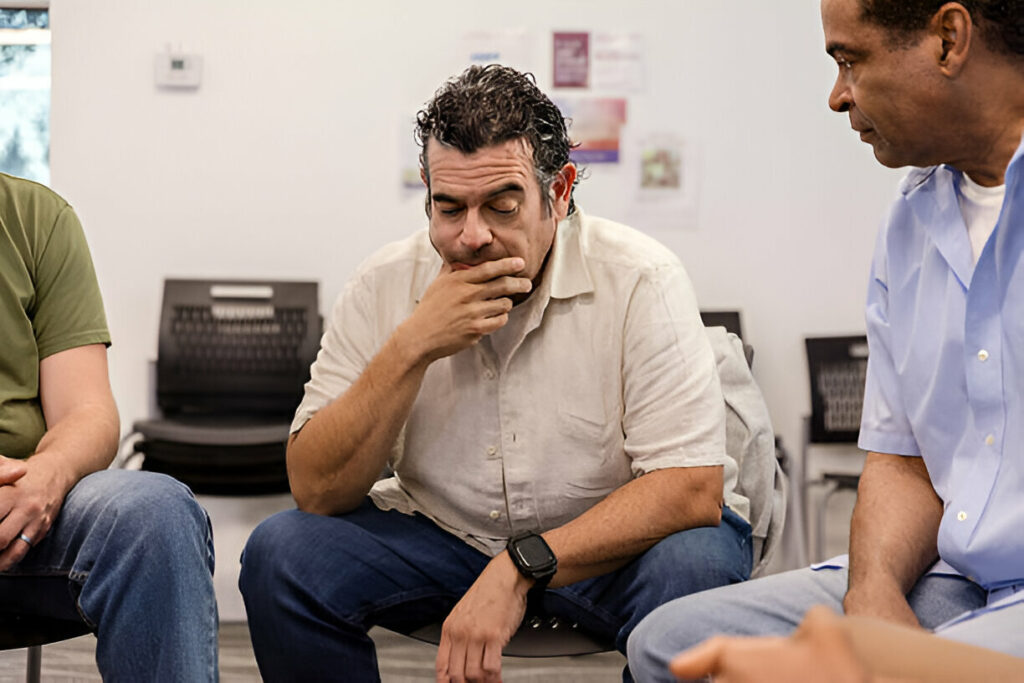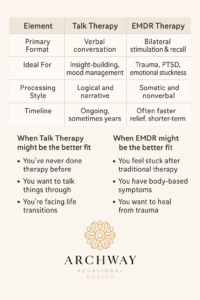You’ve Decided to Get Help—That Alone Is Huge
You’ve done the hard part: you’ve admitted something isn’t working. You’ve researched. You’ve considered therapy. But now comes the big question: Which kind of therapy actually helps me heal?
If you’re navigating trauma, anxiety, or emotional pain that feels bigger than talk can fix, you’re not alone. Many first-time treatment seekers land here—with the knowledge that something needs to shift, but confusion about how to begin.
Two paths tend to stand out: traditional talk therapy and EMDR therapy. Let’s explore both—not to crown a winner, but to help you find your best fit.
What Is Talk Therapy?
Talk therapy, sometimes called “psychotherapy” or “counseling,” is a broad category of treatment that includes many methods:
- Cognitive Behavioral Therapy (CBT) focuses on reframing distorted thoughts and building healthier behavior patterns.
- Psychodynamic Therapy explores past experiences and unconscious patterns that shape current challenges.
- Person-Centered Therapy emphasizes unconditional positive regard and self-exploration through a trusting relationship.
Most talk therapies involve—you guessed it—talking. You process emotions, share your story, and gradually reframe your reactions. Over time, this can be incredibly helpful for anxiety, depression, relationship issues, and general emotional wellness.
But what if you’ve talked about your trauma, and you still feel like it lives in your body?
What Makes EMDR Therapy Different
EMDR stands for Eye Movement Desensitization and Reprocessing. It’s a structured, research-backed therapy method originally developed to help people process traumatic memories—especially those that feel stuck.
Instead of relying primarily on verbal conversation, EMDR therapy uses bilateral stimulation (eye movements, tapping, or sound) to help your brain safely reprocess distressing experiences.
That “fight, flight, or freeze” response that your body can’t shake? EMDR can help calm it—not through logic or language, but by completing a healing process your nervous system never had the chance to finish.
At Archway Behavioral Health, our EMDR therapy in Boca Raton is designed to work with your brain’s natural healing mechanisms—gently, safely, and without overwhelm.
A Side-by-Side Comparison: Talk Therapy vs. EMDR Therapy
| Element | Talk Therapy | EMDR Therapy |
|---|---|---|
| Primary Format | Verbal conversation | Bilateral stimulation & recall |
| Ideal For | Insight-building, mood management | Trauma, PTSD, emotional stuckness |
| Processing Style | Logical and narrative | Somatic and nonverbal |
| Timeline | Ongoing, sometimes years | Often faster relief, shorter-term |
| Core Strength | Relationship, insight, reflection | Trauma resolution and nervous system healing |
Both forms are powerful. The right fit depends on what you need most: narrative understanding or deep-level integration.
When Talk Therapy Might Be the Better Fit
Talk therapy could be ideal if:
- You’ve never done therapy before and want to start slowly
- You need to build trust, routine, and self-reflection
- You’re navigating life transitions, grief, or interpersonal conflict
- You want to talk things through and build insight
For some, this path is the most accessible and immediately comforting. And there’s no shame in taking a stepwise approach—starting here and moving toward trauma-specific therapies like EMDR later.
When EMDR Might Be the Better Fit
EMDR therapy might be more appropriate if:
- You’ve already tried talking about your trauma and still feel stuck
- You experience body-based symptoms like panic, hypervigilance, or numbness
- You want to avoid rehashing details but still want to heal
- You’re dealing with trauma, addiction, or chronic anxiety
Looking for EMDR therapy in Delray Beach, Florida or the surrounding areas? Our Boca Raton clinicians offer trauma-informed care that meets you where you are—not where you “should” be.
EMDR Isn’t Just for Big Trauma
You don’t need a single “major trauma” to benefit from EMDR. It works just as well for:
- Emotional neglect
- Chronic rejection or invalidation
- Childhood instability
- Loss or grief
- Medical trauma
Sometimes it’s not what happened, but what was missing, that leaves a wound. EMDR therapy in Florida can help address those experiences without needing a clear timeline or full story.
Can You Combine EMDR and Talk Therapy? Absolutely.
Healing doesn’t have to follow a straight line. Many of our clients integrate both:
- They use talk therapy for reflection, processing life events, and relationship work
- Then use EMDR therapy for deeper trauma reprocessing when needed
This integrative approach is especially common in treatment programs like ours—where we support both the mind and the body’s memory of pain.
Looking for EMDR therapy in Deerfield Beach, Florida? Our location in Boca Raton is a short drive from multiple South Florida communities.
FAQs: What Clients Ask Before Starting Therapy
Will EMDR feel overwhelming?
No. The process is structured so you always stay grounded. We don’t dive in headfirst. The early sessions are all about building stability and trust.
Do I have to talk through every detail in EMDR?
Not at all. EMDR works even when you keep things vague or abstract. You don’t need to verbalize everything to heal.
How quickly will I feel relief?
Some clients notice change after a few sessions. Others need more time. Everyone’s pace is respected.
Can I switch between therapy types if one doesn’t fit?
Yes. Therapy isn’t a contract—it’s a process. We encourage you to advocate for what feels right and shift when needed.
What if I want help choosing?
Our clinical team can assess your needs and recommend a personalized treatment plan that may include EMDR, talk therapy, or both.
Trust Your Gut—And Ask for Help
Therapy isn’t about fixing you. It’s about creating the conditions where your system feels safe enough to heal. Whether that starts with talking or reprocessing depends on your history, your goals, and your readiness.
You don’t have to choose perfectly. You just have to start somewhere—and we’re here to walk with you.
Begin the Process of Real Healing—Your Way
Call (888) 530-0227 or visit Archway’s EMDR Therapy page to learn more about how we help you choose the path that fits you—not just your symptoms.



